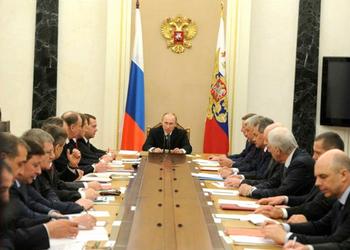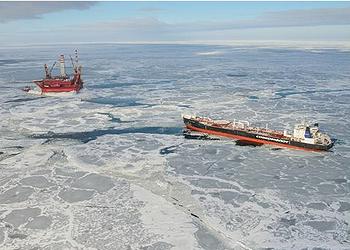Russia Ships First Arctic Oil, Fortifies Oil Defenses
MOSCOW, Russia, April 29, 2014 (ENS) – Riding on his pride in the first export of Russian Arctic oil earlier this month, President Vladimir Putin has signed a law that allows oil and gas corporations to establish private armed security forces to defend their infrastructure, upping the ante for protestors.
On the same day, April 22, Earth Day, Putin also met with the Russian Security Council. There he said, “Oil and gas production facilities, loading terminals and pipelines should be reliably protected from terrorists and other potential threats. Nothing can be treated as trivia here.”

Meeting of Russia’s Security Council on Arctic policy, The Kremlin, April 22, 2014 (Photo courtesy Presidential Press and Information Office)
At the Russian Security Council meeting Putin detailed Russia’s Arctic policy, which includes strengthening military infrastructure in the region, “by restoring a number of airfields beyond the Arctic Circle and the military base on the New Siberian Islands.”
Putin also said Russia “is interested in the region’s sustainable development based on cooperation and absolute respect of international law.”
He said Russia is fully compliant with international requirements for enhancing environmental security in the region, and will rectify “consequences of accidents in hydrocarbon production on the marine shelf” within the framework of the Arctic Council, an intergovernmental forum of the eight Arctic Circle nations.
The Arctic as a whole is believed to hold one-third of the world’s remaining undiscovered oil and gas resources, most of them located offshore.
On April 18, Gazprom loaded the first cargo of oil produced from the Prirazlomnoye field, presently the only Russian hydrocarbon development project on the Arctic shelf.
Demonstrating the importance of Arctic oil exports to Russia, President Putin gave the command by phone to start loading the first shipment of Arctic oil onto Sovkomflot’s specially designed ice-class tanker, the Mikhail Ulyanov.
The shipment is on its way to Russia’s first customer, the French company, Total, the international nonprofit organization Greenpeace revealed.

Mikhail Ulyanov oil tanker arrives at the Prirazlomnaya platform to load Russia’s first shipment of Arctic oil. April 2014 (Photo courtesy Gazprom Neft)
Taking part in the event, Gazprom Management Committee Chairman Alexey Miller said, “Today’s event is highly important for strengthening Russia’s position in the global oil market. We increased the flexibility and reliability of oil supply to almost any part of the world.”
Miller emphasized that the design of the Prirazlomnaya platform secures every process operation, excluding the chance for any oil spills during the production, storage and loading processes.
The produced oil is stored in a caisson with three-meter-high concrete walls covered with a steel plate reinforced with two-layers of corrosion-proof and wear-proof cladding. The caisson can store some 94,000 tons of oil and Miller said “its safety margin greatly exceeds the actual loads.”
A wet method of oil storage used at the platform eliminates the possibility of oxygen getting inside the tanks, creating an explosive environment, according to Gazprom.
Special equipment was developed for transfer of the oil to tankers for transport. “To avoid accidental oil spills, the loading block system goes off in seven seconds at most,” said Gazprom.
“The loading point is chosen depending on a combination of natural factors – sea surge, ice drift, currents, and wind. When an oil vessel goes beyond the sector serviced by one complex,” Gazprom explained in a statement, “the vessel is disconnected and moved to another facility. In order to exclude the incidental collision with the platform, oil vessels are equipped with dynamic positioning systems, which anchor them despite the wind and wave loads.”
But Greenpeace is not reassured that Arctic oil development is safe from spills and certainly not from the effect of burning that oil on the rising planetary temperature.

Loading the first shipment of Russia’s Arctic oil from platform to tanker (Photo courtesy Gazprom Neft)
To alert the public to these dangers, last September Greenpeace staged a high profile protest at the Prirazlomnaya platform in the Pechora Sea.
Russian authorities arrested 28 Greenpeace activists and two freelance journalists, known as the “Arctic 30,” who tried to hang a protest banner from the platform. They were imprisoned for over two months on charges of piracy and hooliganism and freed only following a global outcry and a ruling by a Law of the Sea Tribunal.
Now, with the new Russian law in place allowing Gazprom and other companies to assemble their own armed security forces, such protests carry an even higher risk for activists.
But it is not only environmental activists that Russian officials worry about.
Dmitry Yarosh, a Ukrainian nationalist, presidential candidate and leader of the far-right group Right Sector, threatened last month to blow up pipelines leading from Russia into Europe if a diplomatic solution is not found for the Ukraine-Russia conflict.
Putin is taking such threats seriously, placing Yarosh on an international terrorist list.
At the Russian Security Council meeting April 22, Putin said the Arctic, “is a concentration of practically all aspects of national security – military, political, economic, technological, environmental and that of resources.”
To stay ahead of other nations in the Arctic his government is “reviving the Northern Sea Route,” tripling cargo transport along the route over the past few years.
“Construction of the Arctic seaport of Sabetta, a future checkpoint on this route, is proceeding at a good pace,” Putin said. “A major liquefied natural gas facility is being created at the South Tambey field in Yamal.”
“We have to make sure shipping companies find it profitable and convenient to fly the flag of Russia, so that the bulk of cargo shipments in the Arctic, particularly along the Northern Sea Route, is conducted by vessels under Russia’s jurisdiction,” Putin told the Russian Security Council meeting.
Putin said that to improve quality of government control and decision-making in the Arctic his government will create “a flexible agency that would help to better coordinate the activity of ministries and agencies, of the Russian regions and businesses.”
Russia needs to legally formalize the outer boundary of Russia’s continental shelf in the Arctic Ocean. At the March session of the UN Commission on the Limits of the Continental Shelf, Russia spoke of its right to part of the Sea of Okhotsk that was earlier considered open, “a 52,000 square kilometre area, the bottom of which is the continuation of Russia’s continental shelf,” Putin said.
The UN Commission agreed with Russia and recommended that Russia’s boundary include this area.
Putin said his government “should hold on to every area of the Arctic continental shelf of Russia and its marine basins.” Other Arctic governments are doing the same; the race to secure Arctic territory is on.
Finally, Putin spoke of environmental security.
“The ecological system of the Arctic, as we all know, is fragile; therefore there should be regular environmental monitoring,” Putin said. “We should definitely minimise all environmental risks during the construction of production and maintenance infrastructure, especially in the course of developing the Arctic shelf, and develop an early warning and response system for cases of oil and petroleum product spills and leaks.”
“Prirazlomnaya, which I have already mentioned, has zero waste. This means that we are capable of implementing projects of such quality, and this should become [the] norm,” Putin said.
“Environmental protection is an essential condition for preserving the unique lifestyle of the northern indigenous peoples,” said Putin. “Their wellbeing and stable development are among our key socioeconomic tasks in the region.”
Copyright Environment News Service (ENS) 2014. All rights reserved.
http://ens-newswire.com/2014/04/29/russia-ships-first-arctic-oil-fortifies-oil-defenses/